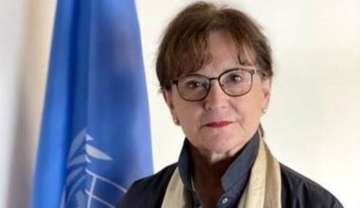The top UN envoy for Afghanistan has called for a modus vivendi for money to flow into the country and for efforts to address the dire humanitarian situation.
Assets and donor funds worth billions of dollars have been frozen by members of the international community. The understandable purpose is to deny these funds to the de facto Taliban administration, Xinhua news agency reported.
The inevitable effect, however, will be a severe economic downturn that could throw many more millions into poverty and hunger, may generate a massive wave of refugees from Afghanistan, and indeed set Afghanistan back for generations, said Deborah Lyons, the UN secretary-general's special representative for Afghanistan.
"As the Afghan currency plummeted, prices of fuel and food have skyrocketed. Private banks no longer have cash to distribute, meaning even Afghans with assets cannot access them. Salaries cannot be paid," she told the Security Council in a briefing on Thursday.
"Afghanistan, heavily import-dependent, will be unable to finance its imports of food and medicine, as well as fuel, electricity, and other essential items," Lyons asserted.
"A modus vivendi must be found- and quickly- that allows money to flow to Afghanistan to prevent a total breakdown of the economy and social order," she said.
Safeguards must be created to ensure that this money is spent where it needs to be spent, and not misused by the de facto authorities. The economy must be allowed to breathe for a few more months, giving the Taliban a chance to demonstrate flexibility and a genuine will to do things differently this time, notably from a human rights, gender, and counter-terrorism perspective, she said.
Lyons said the international community must focus on the pre-existing humanitarian crisis.
Addressing this crisis cannot wait for political decisions regarding the removal of sanctions against Taliban leaders as millions of ordinary Afghans are in desperate need of help, she added.
"This means that needed humanitarian aid must be provided through the United Nations or non-governmental organisations (NGOs). There are in addition countries that have their own sanctions that apply to certain members or groups that are now part of the de facto authority. Relevant mechanisms must be found quickly to allow for UN agencies and NGOs to provide the necessary humanitarian relief," she noted.
"In the current environment, the UN role must be clear and build on our humanitarian imperative. There is an immediate and pressing need to deliver, on a huge scale, essential humanitarian aid in areas such as health, food security, non-food items, and sanitation," said Lyons.
Latest World News
